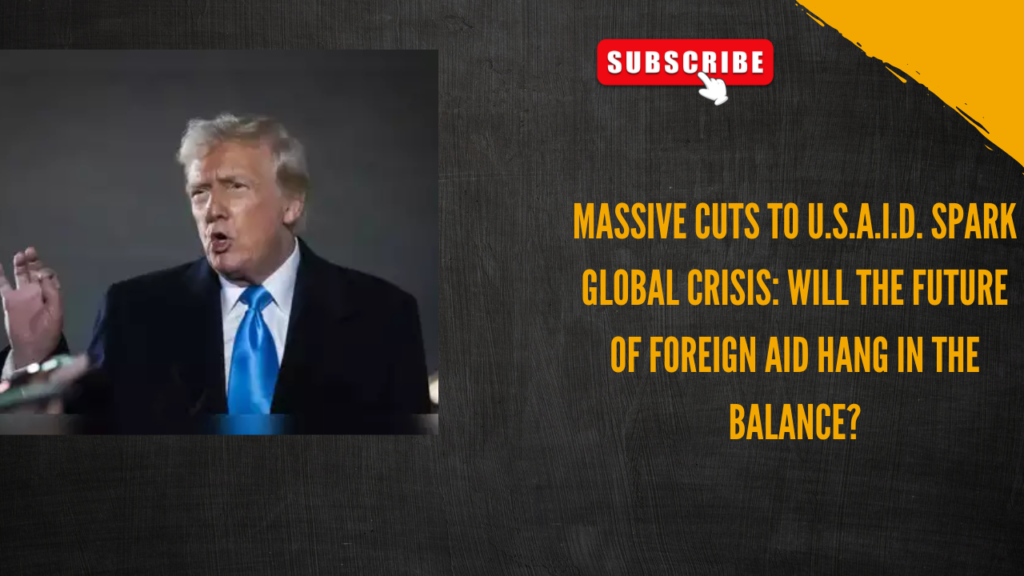
Current Situation Overview
Concerns Over Aid Cuts: A veteran U.S. ambassador in Mozambique reached out to Secretary of State Marco Rubio, warning that proposed cuts to U.S. Agency for International Development (U.S.A.I.D.) would create significant risks for Africa. Meanwhile, a federal judge in Washington temporarily blocked efforts to put thousands of U.S.A.I.D. employees on leave and reduce the agency’s foreign staff.
Temporary Halt on Treasury Access: A federal judge issued an emergency order on Saturday, restricting Elon Musk’s government efficiency program from accessing Treasury Department data and payment systems, citing the risk of “irreparable harm.”
Political Repercussions: President Trump announced on Friday that he was revoking former President Biden’s security clearances, claiming it was retaliation for Biden’s decision to revoke his clearances four years ago.
Kennedy Center Changes: Trump also announced plans to dismiss several board members of the John F. Kennedy Center for the Performing Arts, intending to replace them with his own appointees, including himself as chairman.
U.S.A.I.D. Under Siege
The U.S. Agency for International Development, with its crucial role in humanitarian aid, health, and infrastructure rebuilding worldwide, has been hit hard by drastic cuts. U.S.A.I.D. employees were caught in uncertainty as the Trump administration moved to reduce the agency’s workforce, including suspending thousands of employees and contractors abroad.
A federal judge intervened on Friday, halting the suspension of around 2,700 direct-hire employees. These workers had been poised to face layoffs or indefinite administrative leave by midnight, causing widespread panic. The court’s order temporarily reinstated employees on leave until February 14, but the situation remains unresolved, with a possible Supreme Court case looming.
The agency, which has been integral to global health and disaster relief efforts, now faces an uncertain future. The cuts were reportedly driven by Elon Musk’s efficiency initiative, as well as Pete Marocco, the new head of U.S.A.I.D., appointed by Secretary Rubio.
Though Secretary Rubio tried to calm fears, urging employees to apply for waivers and suggesting that the cuts were not intended to disrupt personal lives, the impact on aid organizations worldwide has been catastrophic. The U.S.A.I.D. staff, along with contractors, have been scrambling to adjust to the rapid changes. Many are now unsure about their job security and potential future within the agency.
Impact on Global Operations
The drastic cuts have deeply affected the global aid sector, with at least 10,000 U.S. jobs linked to U.S.A.I.D. already disappearing. Non-governmental organizations (NGOs) and contractors reliant on U.S.A.I.D. funding have also been forced to make substantial layoffs, as many cannot access necessary funding through the agency’s accounting system. Firms like Resonance, a consulting company primarily working with U.S.A.I.D., have had to lay off most of their staff, as the government has delayed payments and reimbursements, leaving businesses in financial limbo.
Some workers, especially those with families, are grappling with the personal ramifications of these sudden changes. Foreign Service officers, along with contractors, were given just 30 days to return to the U.S. if they wished for government-funded relocation. For many, this decision is fraught with complications, including medical concerns, children’s schooling, and pets.
A Foreign Service officer in Asia found that their only option when a family member required emergency medical evacuation was to return home without funding for travel, leaving their belongings behind. Another officer in Africa is trying to break the news to their children about the likely end of their careers.
U.S. Ambassador’s Warning
Peter H. Vrooman, the U.S. Ambassador to Mozambique, sent an urgent cable to Secretary Rubio, highlighting the dangerous consequences of withdrawing U.S.A.I.D. employees. The ambassador argued that it would severely disrupt the management of $1.5 billion in aid programs, potentially compromising ongoing health and humanitarian initiatives. Over two million Mozambicans rely on U.S.A.I.D. for critical services like antiretroviral drugs for HIV prevention and treatment.
In the cable, Vrooman warned that the loss of experienced staff would leave critical health programs vulnerable, jeopardizing the delivery of essential care to hundreds of thousands. He urged the allowance of a small number of exemptions to ensure the continuation of essential services.
Vrooman further requested that families with school-aged children be allowed to remain until the end of the school year, as the abrupt changes could cause further disruption for those with families overseas. Despite the temporary judicial reprieve, the long-term fate of U.S.A.I.D. remains uncertain, and the implications for global aid are profound.
The Road Ahead
The drastic reduction of U.S.A.I.D. staff has caused deep concern among officials and aid workers, who fear that the resulting chaos could erode the agency’s effectiveness. The industry is in a state of turmoil, with some wondering if this is the beginning of the end for U.S. foreign aid programs, particularly those addressing health and development challenges. As the legal battles unfold, those impacted by the cuts continue to brace for further uncertainty.